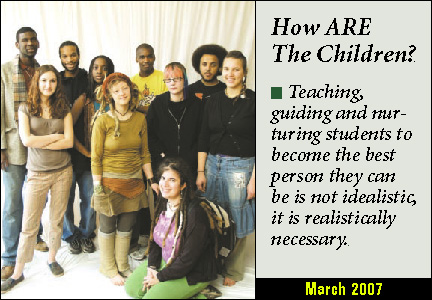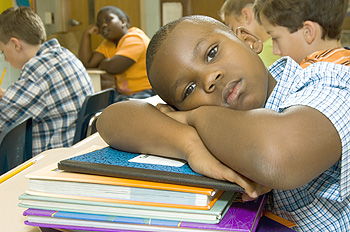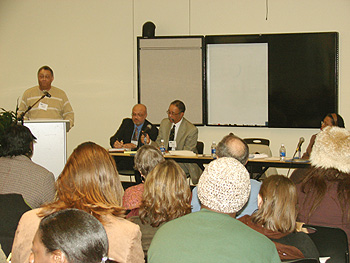Helping Our Youth to Succeed

 By Victoria Rose
By Victoria RoseThere is more than enough talk about what is wrong with education.
From
teachers, administrators, curriculum and occasionally students and
parents, blame is thrown around with enough wasted words to fertilize
all the school lawns and sports fields in the country. One thing that
is not discussed is whether the education system today is ethical.
Support
exists for one thing or another, from research based programs, money
for tutoring, goals for all teachers to be highly qualified,
accountability that includes parents being fined for their child’s
unexcused absences and an endless list of other solutions to the
education crisis. The question of ethics regarding education is not a
hot topic yet it deserves to be the basis for all the other topics.
Ethically,
educators, including the community, should challenge students by
offering them responsibility and opportunities. As Al Whitesides,
Asheville School Board Members said, “Give students expectations and
you’d be surprised by what they do”. Essentially, students will respond
responsibly and opportunistically when they know what expectations
people have for them.
Unfortunately,
education today is based more on what students know as opposed to what
type of person is valued and what meaning is given to life. Teaching,
guiding and nurturing students to become the best person they can be is
not idealistic, it is realistically necessary. Do we want students to
enter the ‘real world’ with the formula of success as simply knowing
what is on a test? Public education measures students through tests,
standardized tests, which are not developed by the professionals
teaching the students. In fact, the tests are not even developed with
the interest of individual students.
 |
| Asheville City Schools Board Member Al Whitesides adresses the concerns of community members at the State of Black Asheville – Education Summit. |
Standardized
tests do have certain values. In today’s educational environment the
value placed on the standardized tests is not reflective of the
students’ ability. Standardized tests do not evaluate what a student
values, nor does it indicate the value of the student as an individual.
Unfortunately, tests are limiting whereas real experience is limitless.
Some of the
educational policies, from standardized tests to attendance, are based
on State requirements. Al Whitesides believes that “What has to be done
today is for everyone to take responsibility. Education starts at home
and then moves to the schools. Parents need to be more involved, just
as the community also needs to be involved. Schools need to do a better
job in communicating to the parents and community.” He also stated,
“Parents have to get involved to help students make the right choices.”
There are
programs in place but the schools need to let the community know about
them. The schools are doing a good job; they just need to work smarter
and to have total help from the community, such as tutors and mentors
to reinforce to students the importance of education. Unfortunately,
many parents and students are just struggling to survive. Having more
community support would help impress academic value to the students and
how limiting their chance for success is if they drop out of school.
The community and educators need to be more understanding about the
baggage students bring to school.
Pick a value —
whether honesty, generosity, courage, freedom, justice, equality, and
respect, and talk to educators, students, community leaders, business
leaders, and find out what their experience is regarding education.
Find out first if the environment is conducive to developing students
with moral values. Secondly, find out if students have basic moral
values when they enter school; not just cultural differences.
Simply talking
about whether students know right from wrong, whether they have the
social skills to show respect, whether they have the ability to ask for
help, and if they are grateful for the opportunity to receive an
education. There are plenty of qualified, caring teachers. Qualified,
defined as teachers who not only teach the required curriculum but have
the ability to relate to the students, to treat them with dignity and
to create safe learning environments.
Teachers are
often the ones advocating for the students who arrive at school without
the necessary skills to be prepared mentally, physically and
emotionally, to learn. Teachers are the ones who find the resources
that will help them succeed. The political hot topic, the achievement
gap, is not simply about achievement, it’s more about the gap between
survival and success!
So the ethical
question to ask is whether it is the school’s responsibility to assist
individuals who are struggling with basic survival, or is it to create
a safe learning environment?
Ethics is only
mentioned once in the 670 page ‘No Child Left Behind’ document, in
relationship to funding Native American Bureau financed schools.
Current educational articles do not mention ethics. Other issues,
longer school days, banning homework, funding sources for schools, and
the never ending mention of the achievement gap, all take precedent.
All without consideration regarding the ethics involved in simply
treating a growing, learning mind with dignity and respect.
After all, how
many ‘real world’ work environments ring a bell to signal when everyone
has to go from one task to the next? How many ‘real’ jobs require
yearly standardized tests to evaluate performance? Why is it that the
Bill and Melinda Gates Foundation have committed and supported The New
School Initiative? Is it because today’s school environment is not
ethically, or competently, preparing students for the ‘real world’? To
further challenge the reader, are parents preparing their children for
school, physically, emotionally and mentally? Going even further, what
is the role the community and government have?
In this
environment that claims to value accountability and responsibility,
which is a necessary component for any type of success, let’s consider
all who need to be responsible. Parents, students, teacher and
administrators are simply the people visible on the front lines. The
communities, especially politicians, are also ethically responsible for
quality education. The tone set by politicians regarding education is
one that has drained the energy and inspiration from many educators and
students.
Racing through
topics and teaching to the test strips the core of learning and focuses
only on repeating facts. Educational administrators have to come up
with numbers that show adequate yearly progress rather than recognized
personal gains. At times, the personal gains will coincide with the
numbers, but the goal for the achievement numbers do not necessarily
coincide with individuals who have achieved success by overcoming their
own personal achievement gap.
Ethically, we
are all responsible for educating our youth just as we are all
responsible for caring the elderly. Essentially, we are all ethically
accountable for the value placed on education and care for each other.
After all, there are not just multiple learning styles, but multiple
experiences that provide learning opportunities.







